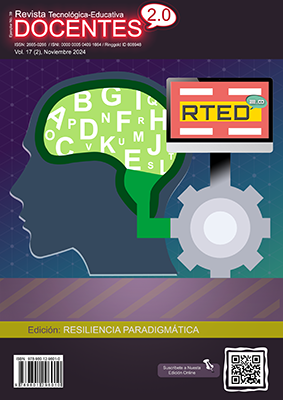Using Theatre to Improve English Oral Production and Comprehension according to Krashen's Theory
 DOI:
https://doi.org/10.37843/rted.v17i2.569
DOI:
https://doi.org/10.37843/rted.v17i2.569
Main Article Content
Abstract
Acquiring a second language, especially in school contexts, faces challenges beyond memorizing vocabulary and grammatical structures. The objective of the research was to apply theater as a pedagogical tool in the English classroom through lesson plans that integrate theater exercises designed to improve oral comprehension and production. It was carried out using the inductive-deductive method, a pragmatic paradigm, mixed approach, sequential type, sequential exploratory design, and cross-sectional. Diagnostic surveys were applied to evaluate the confidence and prior knowledge of 13 fourth-grade students from the Colegio La Presentación de Tunja, who participated in theater workshops designed as structured lesson plans. The workshops integrated theater components to enrich the learning environment and facilitate the acquisition of communicative skills in English. The research collected data through class diaries, observation grids, and final surveys, analyzing the workshops' effectiveness in students' learning, attitudes, and confidence in using English as a second language. This approach provided an in-depth understanding of the influence of theatre as a pedagogical tool in the context of the L2 classroom at the school above.
Downloads
Metrics
Article Details

This work is licensed under a Creative Commons Attribution-NonCommercial-NoDerivatives 4.0 International License.
Those authors who have publications in our journal accept the following terms:
- When a work is accepted for publication, the author retains rights of reproduction, distribution of his/her article for exploitation in all countries of the world in the format provided by our magazine and any other magnetic medium, optical, and digital.
- Authors will retain their copyright and guarantee the journal the right first to publish their work, which will be simultaneously subject to the Creative Commons Acknowledgment License (Attribution-NonCommercial-NoDerivatives 4.0 International (CC BY-NC-ND 4.0)). That allows third parties to copy and redistribute the material in any medium or format, under the following conditions: Acknowledgment - You must properly acknowledge authorship, provide a link to the license, and indicate if any changes have been made. You may do so in any reasonable way, but not in a way that suggests you have the licensor's endorsement or receive it for your use. NonCommercial - You may not use the material for a commercial purpose. NoDerivatives - If you remix, transform, or build from the material, you cannot broadcast the modified material. There are no additional restrictions - You cannot apply legal terms or technological measures that legally restrict you from doing what the license allows.
- Authors may adopt other non-exclusive license agreements to distribute the published version of the work (e.g., deposit it in an institutional archive or publish it in a monographic volume) provided that the initial publication in this journal is indicated.
- Authors are allowed and recommended to disseminate their work through the Internet (e.g., in institutional telematic archives, repositories, libraries, or their website), producing exciting exchanges and increasing the published work's citations.
- Request of withdrawal an article has to be done in writing by the author to the Editor, becoming effective after a written response from the Editor. For this purpose, the author or authors will send correspondence via e-mail: [email protected].
- The author will not receive financial compensation for the publication of his work.
- All Docentes 2.0 Journal publications are under the Open Journal System (OJS) platform at: https://ojs.docentes20.com/.
References
Bessadet, L. (2022). Drama-based approach in English language teaching. Arab World English Journal, 13(1), 525-533. https://doi.org/10.24093/awej/vol13no1.34 DOI: https://doi.org/10.24093/awej/vol13no1.34
Creswell, J. W. (2014). Research design: Qualitative, quantitative, and mixed methods approaches (4th ed.). Sage Publications.
Creswell, J. W., & Plano Clark, V. L. (2017). Designing and conducting mixed methods research (3rd ed.). Sage Publications.
Ivankova, N. V., Creswell, J. W., & Stick, S. L. (2006). Using mixed-methods sequential explanatory design: From theory to practice. Field Methods, 18(1), 3–20. https://doi.org/10.1177/1525822X05282260 DOI: https://doi.org/10.1177/1525822X05282260
Krashen, S. (1981). Second language acquisition and second language learning. Oxford University Press.
Krashen, S. (1983). Principles and practice in second language acquisition. TESOL Quarterly, 17(2), 145-159. https://doi.org/10.2307/3586656 DOI: https://doi.org/10.2307/3586656
Liao, J. (2024). Strategies for enhancing student engagement in higher education management. Region - Educational Research and Reviews, 6(7). https://doi.org/10.32629/rerr.v6i7.2459 DOI: https://doi.org/10.32629/rerr.v6i7.2459
Martínez, A. (2024). El impacto de las técnicas teatrales en la enseñanza de idiomas: Un estudio de caso. Revista Docentes20, 5(1), 25-36.
Mera Ponce, M. J. (2014). Las ventajas del método directo sobre el método de gramática/traducción en el proceso de adquisición de una segunda lengua (Ensayo académico). Universidad de los Hemisferios, Facultad de Artes y Humanidades. Quito.
Montecinos, J. P. (2000). Adquisición y desarrollo del lenguaje y la comunicación: una visión pragmática constructivista centrada en los contextos. Límite: revista de filosofía y psicología, 7, 54-66. https://doi.org/10.18270/limite.v7i0.1462
Murray, H. G., & Green, J. L. (2015). Enhancing student motivation and engagement: The effects of a multidimensional intervention. Educational Psychology Review, 27(4), 581-606. https://doi.org/10.1007/s10648-015-9300-7
Paramio, M. C. (2017). La adquisición del lenguaje en el primer ciclo de educación infantil. Editorial Graó.
Plano Clark, V. L., & Creswell, J. W. (2008). The mixed methods reader. Sage Publications.
Sariyati, I. (2013). The effectiveness of TPR (Total Physical Response) method in English vocabulary mastery of elementary school children. PAROLE: Journal of Linguistics and Education, 3(1), 50-64. http://dx.doi.org/10.14456/parole.2013.6
Tashakkori, A., & Teddlie, C. (2010). SAGE handbook of mixed methods in social & behavioral research (2nd ed.). Sage Publications. DOI: https://doi.org/10.4135/9781506335193






